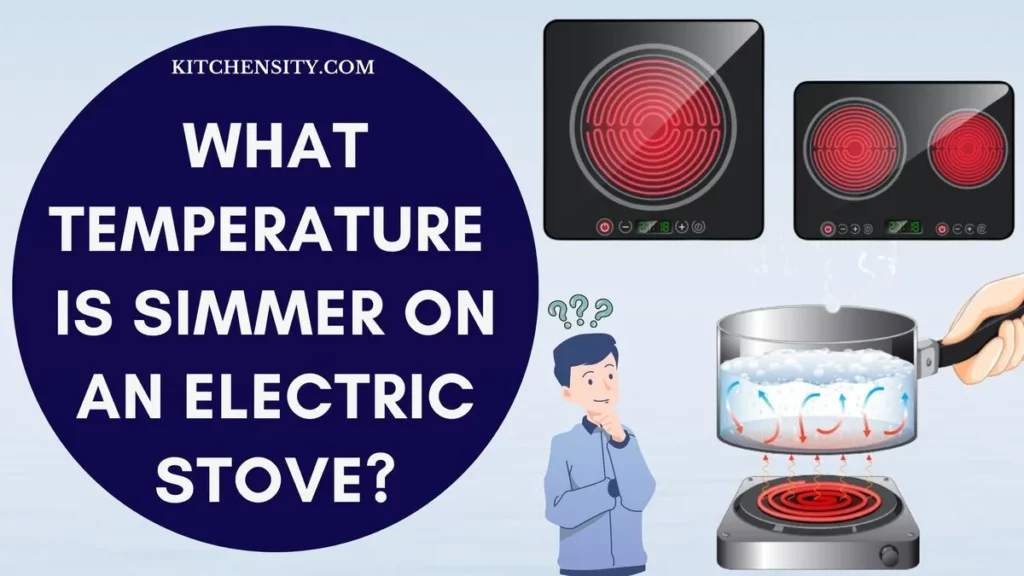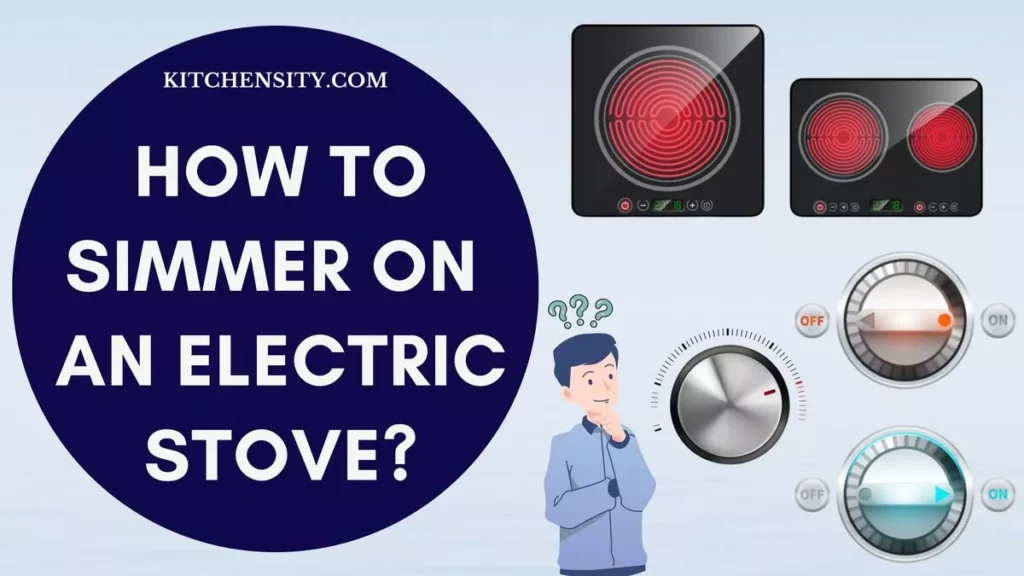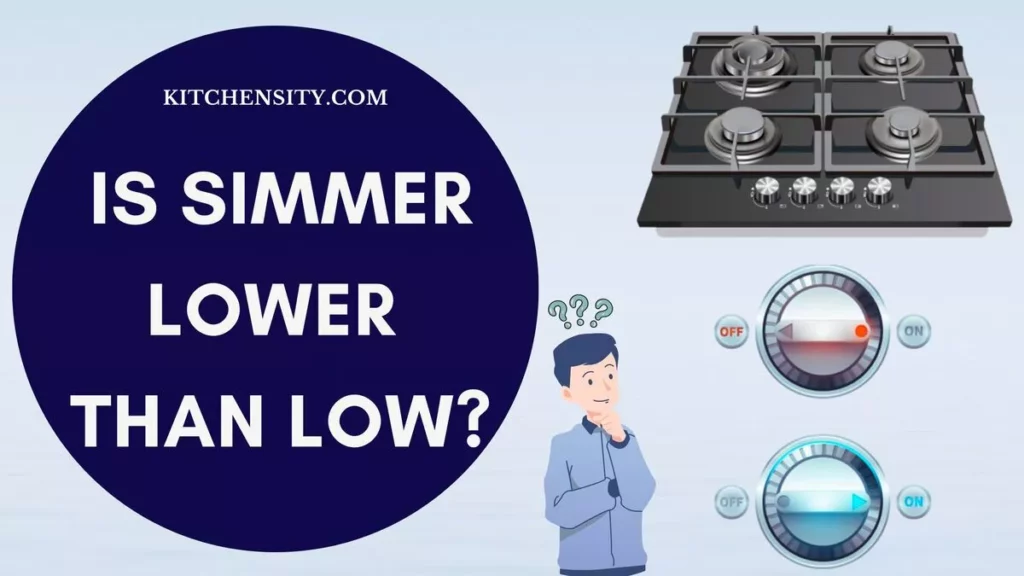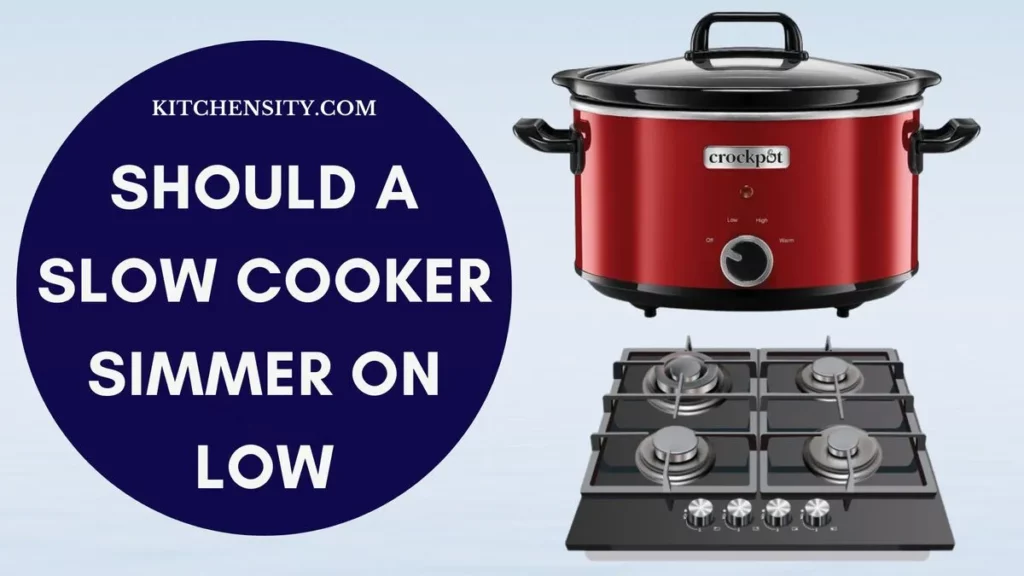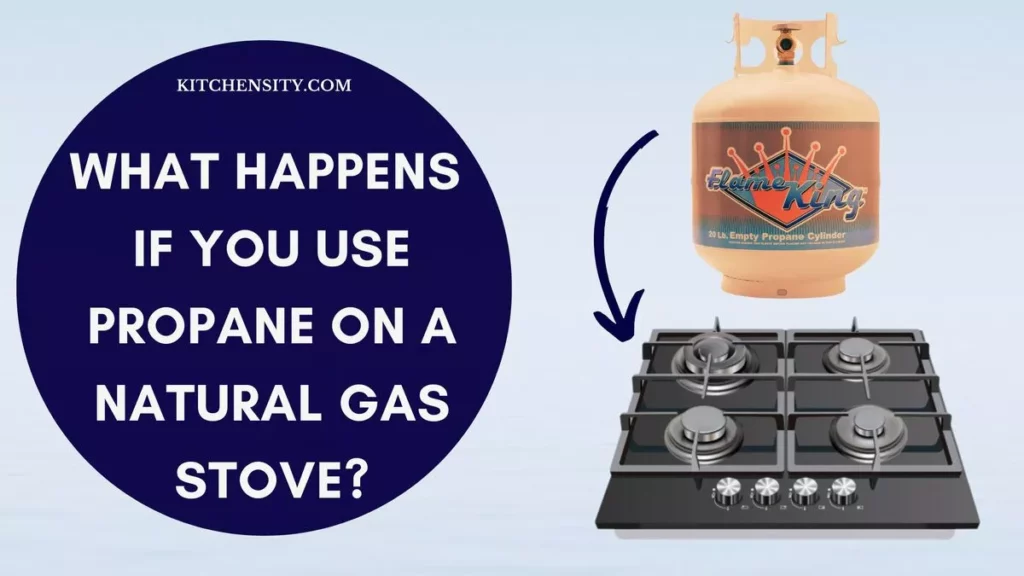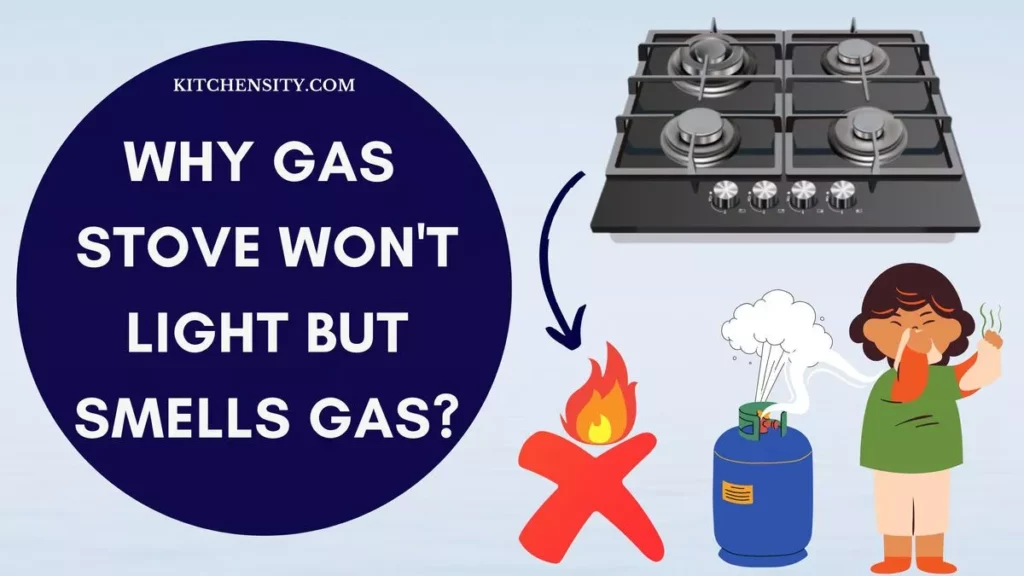In the world of cooking appliances, the battle between brass burners vs cast iron burners has been a hot topic for many kitchen enthusiasts.
These essential components of gas stoves play a significant role in determining the efficiency and performance of your cooking equipment. But which one is the better choice for your kitchen?
In this article, we’ll dive deep into the characteristics, advantages, and disadvantages of both brass and cast iron burners to help you make an informed decision.
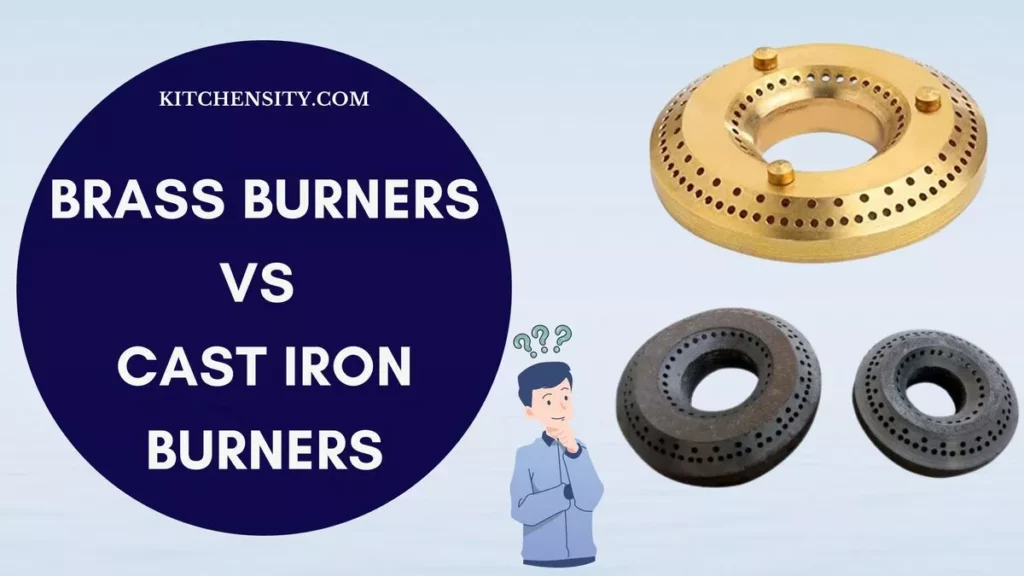
Table of Contents
- 1 Brass Burners Vs Cast Iron Burners – A Quick Comparison
- 2 The Basics: What Are Brass And Cast Iron Burners?
- 3 Detailed Comparison: Brass Burners Vs Cast Iron Burners
- 3.1 1. Heat Distribution: Brass Vs Cast Iron Burners
- 3.2 2. Durability: Which One Lasts Longer?
- 3.3 3. Maintenance And Cleaning
- 3.4 4. Aesthetics: Beauty In The Kitchen
- 3.5 5. Energy Efficiency: Which One Saves You More?
- 3.6 6. Weight: Which One Weigh More?
- 3.7 7. Versatility: Which One Is More Versatile?
- 4 Which Burner Is Better Brass Or Cast Iron?
- 5 Are Cast Iron Burners Good Or Bad?
- 6 Which Is Stronger Cast Iron Or Brass?
- 7 What To Consider When Choosing A Gas Burner Type?
- 8 Final Verdict: Brass Burners Vs Cast Iron Burners
- 9 FAQs (Frequently Asked Questions)
- 9.1 What Type Of Stove Burner Is Best?
- 9.2 Which Burner Type Is Better For High-Heat Cooking?
- 9.3 Are Cast Iron Burners Suitable For Delicate Dishes?
- 9.4 Do Brass Burners Require Any Special Maintenance?
- 9.5 Can I Use Cast Iron Cookware On Brass Burners?
- 9.6 Do Cast Iron Burners Work Well With Induction Cooktops?
Brass Burners Vs Cast Iron Burners – A Quick Comparison
Brass burners excel in even heat distribution, durability, and energy efficiency, making them suitable for those who prioritize these aspects and aesthetics. Cast iron burners are exceptional at heat retention, longevity, and versatility, making them ideal for steady cooking and classic kitchen settings.
Also Read – Do Gas Stoves Need To Be Vented?
Here’s a comparison table summarizing the differences between brass burners and cast iron burners:
| Aspect | Brass Burners | Cast Iron Burners |
| Heat Distribution | Excellent; even heat distribution, minimal hot spots | Exceptional heat retention, consistent cooking temps |
| Durability | Durable, corrosion-resistant | Extremely durable, withstands high temperatures |
| Energy Efficiency | Energy-efficient, quick heating, consistent temps | Efficient heat retention, reduced need for adjustments |
| Maintenance | Relatively low-maintenance, easy cleaning | Requires regular seasoning, rust prevention |
| Aesthetics | May take a bit longer to initially reach the temp | Classic, rustic look complements traditional kitchens |
| Weight | Lighter, suitable for various setups | Heavier due to material, adds stability during cooking |
| Versatility | Suitable for various cookware, most cooktops | Versatile for various cooking tasks, compatible |
| Initial Heating Time | Heats up relatively quickly | May develop a patina over time |
| Appearance Changes | May develop patina over time | Can develop rust without proper seasoning and care |
| Cost | May be more expensive | Generally cost-effective due to longevity |
Also Read – How To Properly Vent A Gas Stove?
The Basics: What Are Brass And Cast Iron Burners?
Before we delve into the comparison, let’s start by understanding the fundamental differences between brass and cast iron burners.
Brass Burners
Brass burners are components commonly found in gas stoves and cooktops. They are constructed primarily from brass, which is an alloy composed of copper and zinc. These burners play a crucial role in the cooking process by providing a source of heat to cook food.
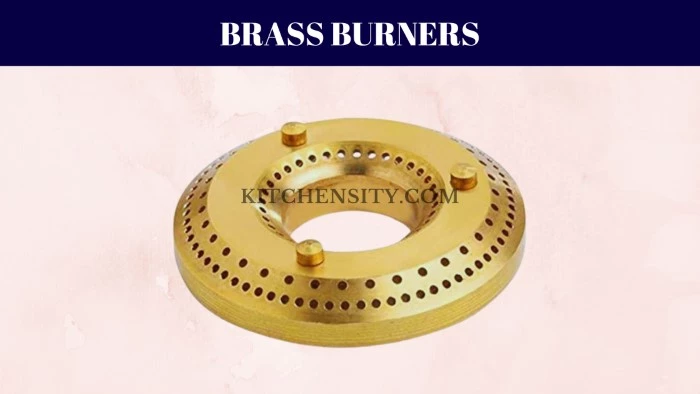
Also Read – Why Electric Stoves Take Forever To Boil Water?
Advantages Of Brass Burners
- Excellent Heat Distribution: One of the most significant advantages of brass burners is their exceptional heat distribution. They evenly spread heat across the cooking surface, ensuring that food is cooked uniformly. This minimizes the chances of hot spots and uneven cooking.
- Durability: Brass is a durable material that is resistant to corrosion. Brass burners tend to have a long lifespan and can withstand the rigors of everyday cooking without showing signs of wear and tear.
- Energy Efficiency: Brass burners are known for their energy efficiency. They heat up quickly and can maintain a consistent temperature, which can lead to shorter cooking times and reduced energy consumption.
- Aesthetic Appeal: Brass burners have an attractive appearance with their golden or brass-colored finish. They add a touch of elegance and sophistication to the kitchen, making them a popular choice for homeowners who value aesthetics.
- Low Maintenance: Brass burners are relatively low maintenance. They don’t require as much care as some other materials and can be easily cleaned with a damp cloth. This simplicity in maintenance is appreciated by many users.
Disadvantages Of Brass Burners
- Cost: Brass burners can be more expensive compared to some other burner materials, which might be a consideration for budget-conscious consumers.
- Weight: Brass is a heavy material, so brass burners can add weight to your stove or cooktop. This might make them less suitable for portable or lightweight setups.
- Appearance Changes: Over time, brass burners may develop a patina or tarnish that alters their appearance. Some people prefer the aged look, while others may find it undesirable.
- Compatibility: Brass burners may not be compatible with all types of cookware. For example, they are not suitable for use with induction cooktops, as these require magnetic materials.
- Initial Heating Time: While brass burners distribute heat evenly, they may take a bit longer to initially heat up compared to some other burner materials.
Also Read – How Hot Do Electric Stove Burners Get?
Cast Iron Burners
On the other hand, cast iron burners are integral components commonly found in gas stoves and cooktops. These burners are constructed using cast iron, a heavy and robust material known for its heat retention properties. Cast iron burners play a crucial role in providing a source of heat for cooking.
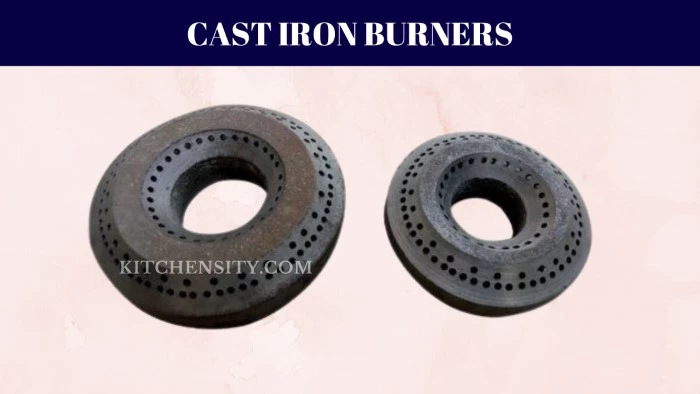
Also Read – Gas Stove Leaking Gas From Burner
Advantages Of Cast Iron Burners
- Exceptional Heat Retention: Cast iron burners are renowned for their ability to retain heat. Once they reach the desired temperature, they can maintain it consistently. This makes them ideal for tasks that require steady and consistent heat, such as simmering and slow cooking.
- Durability: Cast iron is an extremely durable material. Cast iron burners can withstand high temperatures without warping or cracking, and with proper care, they can last a lifetime.
- Versatility: Cast iron burners are versatile and can accommodate various types of cookware, including cast iron skillets and Dutch ovens. They are also suitable for grilling and searing.
- Even Heat Distribution: While they are primarily known for heat retention, cast iron burners also provide relatively even heat distribution, ensuring that food is cooked uniformly.
- Classic Appearance: Cast iron burners have a rustic and timeless appearance. They may not have the same shine as some other materials, but their rugged look can complement traditional and cozy kitchen settings.
Disadvantages Of Cast Iron Burners
- Weight: Cast iron is a heavy material, and this weight can make cast iron burners heavier than some other burner materials. This can be a drawback if you have a portable or lightweight cooking setup.
- Maintenance: Cast iron burners require more maintenance compared to some other materials. They need to be seasoned regularly to maintain their non-stick properties and prevent rust. Cleaning can also be more involved, requiring special care to avoid damaging the seasoning.
- Initial Heating Time: Cast iron burners may take longer to heat up initially compared to materials like brass. This can extend the time it takes to start cooking.
- Appearance Changes: Cast iron burners can change in appearance over time. They may develop rust if not properly seasoned and maintained. Some users appreciate the patina that develops, while others may find it undesirable.
- Energy Consumption: While cast iron burners excel in heat retention, they may consume slightly more energy during the initial heating phase. However, this is often balanced by their ability to reduce the need for frequent adjustments.
Also Read – Why Gas Stove Won’t Light But Smells Gas?
Detailed Comparison: Brass Burners Vs Cast Iron Burners
1. Heat Distribution: Brass Vs Cast Iron Burners
- Brass Burners:
- Brass burners excel in heat distribution.
- They evenly distribute heat across the cooking surface, ensuring your food cooks uniformly.
- This even heating prevents hot spots, which can lead to unevenly cooked dishes.
- Cast Iron Burners:
- Cast iron burners are also proficient in heat distribution but have a unique characteristic.
- They take a bit longer to heat up initially, but once they reach the desired temperature, they retain heat remarkably well.
- This makes them perfect for tasks that require consistent heat, such as simmering and slow cooking.
2. Durability: Which One Lasts Longer?
- Brass Burners: Brass burners are durable and corrosion-resistant, making them a long-lasting choice. With proper care and maintenance, they can serve you well for many years without showing signs of wear and tear.
- Cast Iron Burners: Cast iron burners are renowned for their longevity. They are incredibly robust and can withstand high temperatures without warping or cracking. With routine seasoning to prevent rust, cast iron burners can be a lifelong investment.
3. Maintenance And Cleaning
- Brass Burners: Brass burners are relatively easy to clean. They don’t require as much maintenance as cast iron burners, and a simple wipe-down with a damp cloth can keep them looking shiny and clean.
- Cast Iron Burners: Cast iron burners demand more maintenance. They need to be seasoned regularly to maintain their non-stick properties and prevent rust. Cleaning can be a bit more involved, requiring special care to avoid damaging the seasoning.
Also Read – How To Fix A Yellow Flame On A Gas Stove?
4. Aesthetics: Beauty In The Kitchen
- Brass Burners: Brass burners bring an elegant and timeless look to your kitchen. Their golden hue adds a touch of sophistication to your cooking space, making them a popular choice among homeowners who prioritize aesthetics.
- Cast Iron Burners: Cast iron burners have a rustic charm. They may not have the same shine as brass burners, but their rugged appearance can complement a cozy, traditional kitchen setting.
5. Energy Efficiency: Which One Saves You More?
- Brass Burners: Brass burners are known for their energy efficiency. They heat up quickly and maintain a consistent temperature, which can lead to reduced cooking times and lower energy consumption.
- Cast Iron Burners: Cast iron burners, while excellent at retaining heat, may consume slightly more energy during the initial heating phase. However, their ability to retain heat can also save energy in the long run by reducing the need for frequent adjustments.
6. Weight: Which One Weigh More?
- Brass Burners: Lighter compared to cast iron, suitable for various setups.
- Cast Iron Burners: Heavier due to the material, which adds stability during cooking.
Also Read – Orange Flame On The Gas Stove: Causes And Fixes
7. Versatility: Which One Is More Versatile?
- Brass Burners: Suitable for various cookware, including cast iron, on most types of cooktops.
- Cast Iron Burners: Versatile for cooking tasks and compatible with a wide range of cookware.
Which Burner Is Better Brass Or Cast Iron?
The decision between brass burners and cast iron burners comes down to your specific cooking needs and preferences, as both have their strengths and weaknesses.
Brass Burners are better if you prioritize:
- Even Heat Distribution: Brass burners excel at distributing heat evenly across the cooking surface, ensuring your food cooks uniformly and reducing the chances of hot spots.
- Durability: Brass is resistant to corrosion, making these burners durable with proper care. They can last for years without showing signs of wear and tear.
- Energy Efficiency: Brass burners are known for their energy efficiency. They heat up quickly and can maintain a consistent temperature, which can lead to shorter cooking times and reduced energy consumption.
- Low Maintenance: Brass burners are relatively low maintenance and can be easily cleaned with a damp cloth.
- Aesthetics: They have an elegant golden appearance that adds a touch of sophistication to your kitchen.
Cast Iron Burners are better if you prioritize:
- Exceptional Heat Retention: Cast iron burners are outstanding at retaining heat, making them ideal for tasks that require steady and consistent temperatures, such as simmering and slow cooking.
- Longevity: Cast iron is extremely durable and can withstand high temperatures without warping or cracking. With proper care, cast iron burners can last a lifetime.
- Versatility: Cast iron burners are versatile and can accommodate various types of cookware. They are also suitable for grilling and searing.
- Classic Appearance: They have a classic and timeless appearance that complements traditional kitchen settings.
So, neither brass burners nor cast iron burners are universally “better” than the other. The choice should align with your cooking style, aesthetic preferences, and priorities.
If you value even heat distribution, energy efficiency, and low maintenance, brass burners may be the better choice. On the other hand, if you prioritize heat retention, longevity, and a classic appearance, cast iron burners could be the ideal option for your kitchen.
Also Read – How To Convert A Natural Gas Stove To Propane?
Are Cast Iron Burners Good Or Bad?
Cast iron burners are neither inherently “good” nor “bad.” Whether cast iron burners are a suitable choice for you depends on your specific cooking needs, preferences, and priorities.
Cast iron burners are good for specific cooking needs and preferences, especially if you prioritize exceptional heat retention, durability, versatility, and a classic appearance. However, they may not be suitable for everyone due to their maintenance requirements, weight, and potentially longer initial heating times.
Which Is Stronger Cast Iron Or Brass?
Between cast iron and brass, cast iron is generally considered the stronger material. Here’s why:
Cast Iron:
- Cast iron is an extremely robust and durable material known for its strength and ability to withstand high temperatures.
- It has a high tensile strength, which means it can endure substantial forces without breaking or deforming.
- Cast iron is often used in applications where strength and durability are essential, such as in construction, engine components, and cookware like cast iron skillets and Dutch ovens.
- It has a reputation for longevity and is known for its ability to last for generations with proper care.
Brass:
- While brass is a durable material in its own right and has excellent corrosion resistance, it is not as inherently strong as cast iron.
- Brass is more malleable and ductile than cast iron, which means it is easier to deform under pressure.
- Brass is often used in applications where corrosion resistance and aesthetics are more critical than sheer strength, such as in musical instruments, plumbing fixtures, and decorative items.
So, if you’re looking for a material that is inherently stronger and more suited to applications requiring high strength and durability, cast iron is the better choice when compared to brass.
However, the choice between the two materials depends on the specific use case and the properties you prioritize, as each has its own set of advantages and disadvantages.
Also Read – Why Is My Gas Stove Not Clicking?
What To Consider When Choosing A Gas Burner Type?
When choosing a gas burner type for your kitchen, it’s essential to consider several key factors to ensure it meets your cooking requirements and preferences:
- Burner Size And Quantity: Assess your cooking needs and the size of your cookware. Choose burners that accommodate your largest pots and pans comfortably. Additionally, consider the number of burners you need, ranging from two to six or more, depending on your cooking habits.
- Type Of Gas: Determine whether you have access to natural gas or propane. Your gas burner choice should align with the type of gas available in your area. Some stoves are convertible between the two types, offering flexibility.
- Heat Output And Control: Look for burners with adjustable heat settings for precise control over cooking temperatures. High-heat output burners are ideal for searing and boiling, while simmer burners are essential for low-heat tasks like delicate sauces.
- Burner Material: Consider the material of the burner grate or burner itself. Common options include cast iron, stainless steel, or enamel-coated materials. Cast iron grates, for example, are durable and excellent at heat retention but require seasoning and maintenance to prevent rust.
- Design And Aesthetics: Ensure that the gas burner’s design complements your kitchen’s aesthetic and layout. Some prefer modern and sleek designs, while others may opt for a classic or rustic appearance.
- Safety Features: Look for safety features such as flame failure protection, which shuts off the gas supply if the flame goes out. Additionally, consider the type of ignition, which can be electric (quick and easy) or manual (requiring a match or lighter).
- Maintenance Requirements: Different materials have varying maintenance needs. Some may require regular cleaning, seasoning, or specific care to maintain their appearance and functionality.
- Budget: Consider your budget when choosing a gas burner type. Prices can vary significantly based on features, materials, and brands. Determine a budget that aligns with your requirements.
- Brand And Warranty: Research reputable brands that are known for producing high-quality gas burners. Check for warranties, as they can provide peace of mind regarding potential repairs or replacements.
Selecting the right gas burner type involves assessing your cooking habits, available resources, and kitchen aesthetics. By considering these factors, you can make an informed choice that enhances your cooking experience and meets your specific needs.
Also Read – Do Gas Stoves Turn Off Automatically?
Final Verdict: Brass Burners Vs Cast Iron Burners
The choice between brass burners and cast iron burners depends on your specific cooking needs and preferences.
Brass burners excel in even heat distribution, durability, and ease of maintenance, making them suitable for those who prioritize these aspects. Cast iron burners are exceptional at heat retention, ideal for those who require steady and consistent heat, and appreciate the classic appearance.
Consider your cooking style, aesthetic preferences, and budget when making your decision, as both options have their unique strengths and weaknesses.
Also Read – How Long Can You Leave An Electric Stove On?
FAQs (Frequently Asked Questions)
-
What Type Of Stove Burner Is Best?
The best type of stove burner depends on your specific cooking needs and priorities. Gas burners are preferred for precise control, while induction burners are energy-efficient and easy to clean.
-
Which Burner Type Is Better For High-Heat Cooking?
For high-heat cooking, brass burners are preferred due to their excellent heat distribution and quick heating capabilities.
-
Are Cast Iron Burners Suitable For Delicate Dishes?
Cast iron burners can be used for delicate dishes, but they require careful temperature control to avoid overheating.
-
Do Brass Burners Require Any Special Maintenance?
Brass burners are relatively low-maintenance and only need periodic cleaning to maintain their shine.
-
Can I Use Cast Iron Cookware On Brass Burners?
Yes, you can use cast iron cookware on brass burners without any issues.
-
Do Cast Iron Burners Work Well With Induction Cooktops?
Cast iron burners are not compatible with induction cooktops, as they are not magnetic.
🔧 Stove Expert | 🔥 Gas Guru | 🏠 DIY Enthusiast | 🎨 Painter Extraordinaire
John Davis is your go-to source for all things stoves, from expert repairs to maintenance tips. With a deep understanding of gas systems, including natural and propane, John ensures your kitchen stays cooking safely. His passion for DIY home and kitchen projects shines through his stunning paint transformations. Trust John to bring warmth and functionality to your home, one stove at a time.

